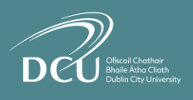About English And History in Dublin City University
The English and History subject areas are each presented as a suite of six modules which cover different aspects of that subject, for example Land, Politics & Society in Independent Ireland in History or The Renaissance in Literature.
Careers
The Bachelor of Arts (Hons) in English and History degree programme facilitates those interested in pursuing any kind of work that requires critical thinking skills, high quality written expression, and transferable skills such as organisation and time-management, and these skills and abilities are highly valued by employers. The knowledge and skills you will develop are useful and valuable to have no matter what path you take once you successfully complete your DCU degree programme. Graduates from the Bachelor of Arts (Hons) in English and History programme will be able to go on to a variety of postgraduate programmes and careers in those subject areas. This has already been demonstrated by existing graduates who have, to take the example of one graduate, gone on to complete postgraduate studies in Literature and is now a published author working in an Irish University and is a member of the Humanities Programme Board, helping to shape the development of the degree. Similarly, several graduates of the programme have, in addition to their other work as third-level academics in other institutions, returned to work as tutors, bringing their experience as online-learning students to that work.
Many of those studying on the Bachelor of Arts (Hons) in English and History do so with the ambition of becoming a post-primary teacher, with the Literature and History modules being recognised by the Teaching Council of Ireland for the teaching of English and History at post-primary level
Academic qualification equivalents
- Standard 12 through a recognised awarding body with average grades of 80% or above. Please note an average of all subjects studied will be taken. Mathematics and English must be included.
English language requirements (one of the below):
- IELTS for Undergraduate Programmes: Overall score of 6.5 or above, with no less than 6.0 in any one skill.
- TOEFL: Total Score of 92. DCU Business School additionally requires all section scores 21 or above.
- PTE Academic: Minimum score of 63, with no section score below 59
Dublin City University Highlights
| University Type |
Public University |
| Campus Setting |
Urban |
| Establishment Year |
1975 |
| No. of Campuses |
3 |
| No. of Residence Halls |
3 |
| International students |
2,337
71% in UG, 29% in PG courses |
| Research Funding |
~35 million EUR |
| Cost of Attendance |
~22,500 EUR |
| Applications Accepted |
Online/Offline |
| Work-Study |
Available |
| Intake Type |
Semester wise |
| Mode of Program |
Full time and online |
Dublin City University Average Tution fees And Other Expenses
Foreign students who wish to enrol at Dublin City University must be aware of the associated costs in order to budget appropriately and apply for scholarships when needed. The tuition costs for well-known programmes and other expenses related to studying in Ireland are covered below.
Tuition Fee for Dublin City University
Here are the details of the UG and PG fees for international students planning to study at any of the following faculties.
| Programs |
UG (EUR) |
PG (EUR) |
| Engineering |
15,000 |
17,000 |
| Business |
14,000 |
16,000-19,000 |
| Humanities |
15,000 |
15,000 |
| Science |
15,000 |
15,000 |
| Education |
12,600 |
13,700 |
Dublin City University Cost of Living
The cost of living here includes monthly expenses an international student would require to study at Dublin City University:
| Expense |
Monthly Cost (EUR) |
| Rent (On-campus) |
692-1216 |
| Rent (Off-campus) |
850-1300 |
| Food |
250 |
| Travel |
132 |
| Books and Materials |
75 |
| Medical |
45 |
| Miscellaneous |
178 |
| Total |
Approximately 2,222 |
